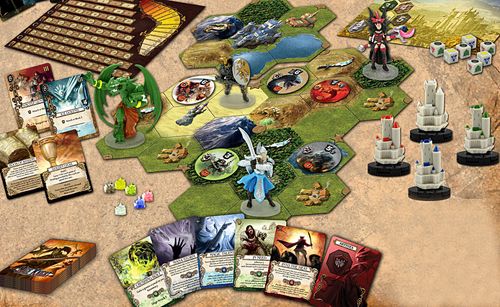I’m working on some board game write-ups and reviews, and it’s worth remembering why board games are an awesome way to spend our time.

I’ve put myself on a path to improve my physical well-being. Being more mindful of what and how much I eat, walking with the intent to start running, looking into a local gym, and so on. Mostly, I fear the atrophy that comes with a sedentary day job and an equally low-impact life at home, and if I’m honest, I’m unhappy with the amount of flab I currently have on my frame. However, making such a change is relatively easy. The body can adapt to adjustments in schedule and activity rather well, all things being equal, and it’s really a matter of establishing and sticking to habits than anything else.
But what about the brain? The most vital of organs also needs maintenance and attention as we age. It’s important to keep the mind engaged and not just feed it something distracting or shallow all of the time. I mean, I won’t begrudge people who really enjoy “Dancing With The Stars” or “Two And A Half Men”, some people do need to unwind with that kind of fare. I’m simply not one of them. As much as I like the occasional campy pleasure like Flash Gordon, more often than not I look to have my brain fed, to keep it trained, to present it with challenges it must overcome.
That, in part, is why I enjoy tabletop games so much.
It took me a while in my youth to really grasp how important it was to me to keep playing them. For a time, I simply enjoyed spending time with my dad, even if I would sometimes let myself get bored between moves rather than studying his strategy and planning my response. Nowadays I can’t imagine sitting entirely idle during an opponent’s turn, though I do occasionally get distracted. Not only is it necessary to pay attention in order to look for victory, it’s an exercise in putting yourself in another’s position, or imagining the other as a complex being instead of just someone to beat. That, to me, is just as important as winning.
I am quite fortunate to be in a place where I can spend time around other gamers who are engaging in this way almost constantly. My co-workers play and even design games on a daily basis. A fantastic store is within easy driving distance to present all sorts of challenges. My father lives a bit further up the road. When I get home, I have the option to play something like Civilization V, Magic: the Gathering – Duels of the Planeswalkers, or Blood Bowl with other human beings. And on rare occasions, a game of Chez Geek or Dungeon Roll might break out.
To me, the important factor in this is that other people are involved. No programmed response or solitaire experience really throws a wrench into your thought processes like another live human being. It makes the problem solving more complex, and thus more rewarding, even when you lose. On top of that, being in a situation with another person as your opponent builds character and social skills. Trite as it may sound, we learn more from losing than from winning, both about how we play and how we act. It’s one thing to gnash your teeth and swear at something like Super Meat Boy or Hotline Miami; doing so at a stranger or even a friend is quite another issue. Fun as it can be amongst people who know you to engage in name-calling for the sake of in-game banter, when it comes to playing with strangers or in a competition it’s important to know your limits and when and how to gracefully bow out of things, or the optimal way to accept and celebrate victory in front of those who’ve lost. You can only get that through this sort of play, and you learn it as your brain is trained.
Boring as it may seem to some outside observers, when I’m engaged in a game like this, I assure you, I’m never really bored.



